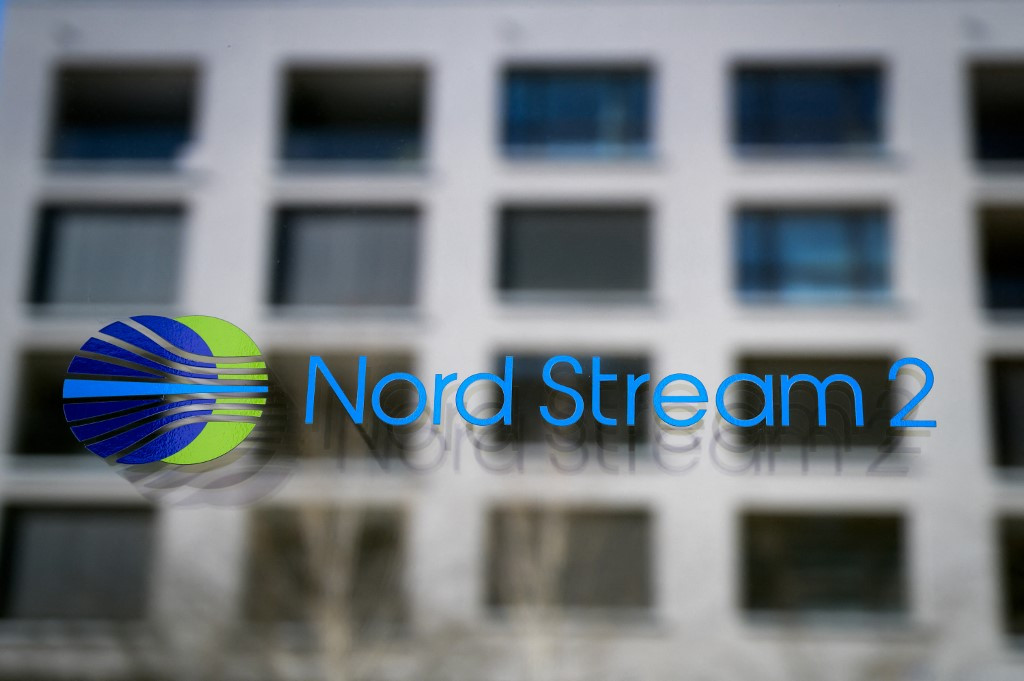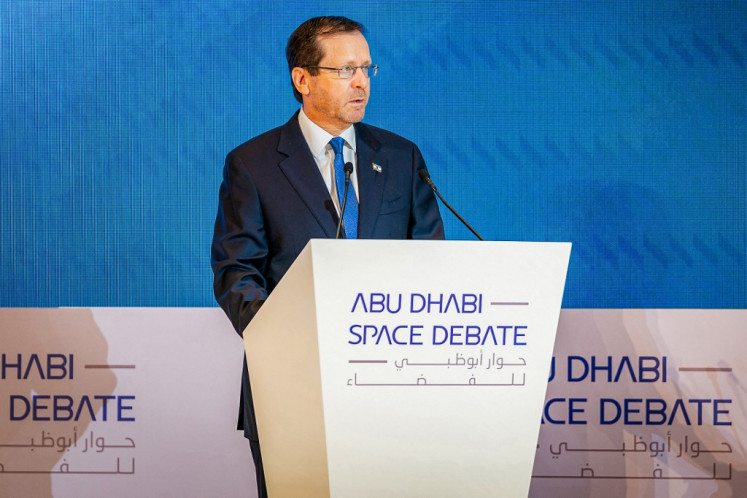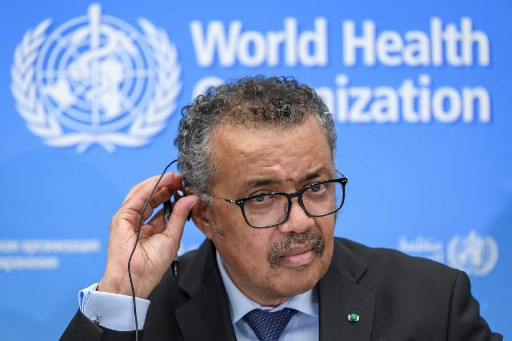Popular Reads
Top Results
Can't find what you're looking for?
View all search resultsPopular Reads
Top Results
Can't find what you're looking for?
View all search resultsEU seeks energy price-busting strategy amid Ukraine crisis
As companies and consumers alike labor under the strain with food and energy prices soaring to multi-decade highs, governments are pondering what means they have at their disposal to react and lessen the pain.
Change text size
Gift Premium Articles
to Anyone
 A photograph taken on March 4, 2022, in Zug shows the sign of the Swiss-based pipeline project company Nord Stream 2 that had filed for bankruptcy and laid off its entire workforce of 106 people following sanctions imposed on the Russian-European gas pipeline project in retaliation for Russia's invasion of Ukraine. (AFP/Fabrice Coffrini)
A photograph taken on March 4, 2022, in Zug shows the sign of the Swiss-based pipeline project company Nord Stream 2 that had filed for bankruptcy and laid off its entire workforce of 106 people following sanctions imposed on the Russian-European gas pipeline project in retaliation for Russia's invasion of Ukraine. (AFP/Fabrice Coffrini)
E
uropean states are urgently seeking policies to stem the energy inflation tide amid conflict in Ukraine which has sparked price hikes -- notably of oil, which has soared past $100 a barrel.
As companies and consumers alike labor under the strain with food and energy prices soaring to multi-decade highs, governments are pondering what means they have at their disposal to react and lessen the pain.
The policy arsenal includes trimming energy taxes and prices, along with targeted state support with some economies across the continent suffering a heavier burden than others.
The European Commission said at the start of this month it could extend a suspension on rules on budgetary rigour through to next year as several EU states urged a common response to the war's financial fallout, on the heels of that wrought by the pandemic.
- Each to his own -
Sweden, whose fuel taxes are the highest in Europe, on Monday announced a temporary tax cut of 1.30 krona per litre ($0.13/12 euro cents) as part of a $1.5 billion package of measures.
Belgium and the Netherlands have meanwhile elected to cut VAT on fuel -- natural gas, electricity and heating-- and also trim fuel taxes to cut pump prices.
Belgian consumers will save around 10 euros on a full tank of 60 litres while an average Dutch family will see their energy outlay go down by some 140 euros across January-June.
In Belgium, the poorest households will be able to benefit from a "social tariff" on electricity and natural gas through to September.
The Polish government has extended a range of measures brought in before the Ukraine war erupted which were designed to act as an inflation "shield."
As Prime Minister Mateusz Morawiecki noted last weekend, "the fight against Putin brings costs" with it.
Since February 1, VAT on gas had already been scrapped from its previous level of 23 percent.
Some five million families in Poland -- which has welcomed in at least 1.8 million fleeing Ukrainians -- are also to receive a package of aid to help them cope with rising food prices.
- There's a limit -
Despite the raft of announced measures European states will not look to loosen their financial belts unduly.
The Italian government said at the start of March it intends to "maintain a prudent budgetary policy" after unveiling a 5.5-billion-euro package of aid measures in February to keep soaring household bills in check.
In Germany, the government decided Wednesday to double state support towards heating bills, having earmarked a package of help last month for the most vulnerable in society. At the same time, Berlin promised to reapply the budgetary brakes from next year.
Such aid will likely involve, as in France, petrol pump price cuts.
In announcing its own "resilience plan" on Wednesday, France stressed the policy, estimated cost of 6.8 billion euros, did not amount to a "whatever it costs" strategy.
- European solution? -
French Finance Minister Bruno Le Maire earlier this month urged partners to come up with a "collective European solution" with the situation has become urgent in some countries.
In Hungary, where fuel prices have been capped since the autumn, there was panic last week when some small stations ran dry.
The government had to limit access by lorries weighing more than 7.5 tonnes. They will now have to fill up at designated stations.
Slovenia for its part was this week confronted by an influx of vehicles from neighbouring Italy coming to stock up after the former's government decided to cap prices.
In Spain, labouring under soaring prices, the government has promised to act after truckers said the soaring cost of diesel was leaving them in a "catastrophic" situation.
Prime Minister Pedro Sanchez has made a series of trips to EU partners seeking an accord on a joint strategy to deal with the problem at a March 24-25 summit.
At the same time, Madrid has hinted that it will take unilateral measures if a common agreement does not materialise.
jnb/jbo/clr/cdw/rlp
© Agence France-Presse








